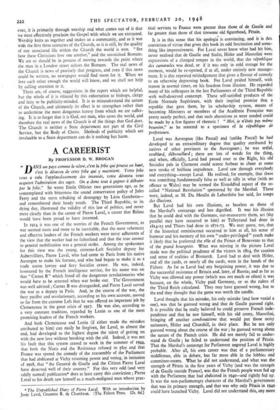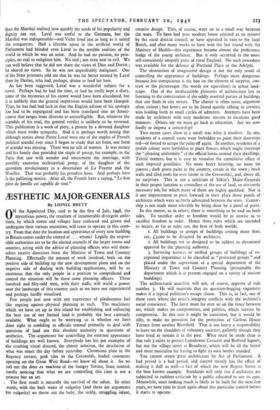A CAREERIST
By PROFESSOR D. W. BROGAN
" DANS un pays comme le ?tome, c'est la folie qui pousse en haut, c'est le desaveu de cette folie qui y maintient. Votre folie VOUS a valu l'applaudissement des insenses, votre desaveu vous acquiert ('admiration des sages. On a donc tout a gagner a Muter par la folie." So wrote Emile 011ivier two generations ago, as he contemplated with bitterness the sound conservative policy of Jules Ferry and the stern rebuking of demagogy by Leon Gambetta- and remembered their heady youth. The Third Republic, to its dying day, illustrated the validity of this law of politics, and never more clearly than in the career of Pierre Laval, a career that Balzac would have been proud to have invented.
In 1914 it was one of the worries of the French Government, as war seemed more and more to be inevitable, that the most vehement and effective leaders of the French workers were noisy adherents of the view that the worker had no fatherland and that the true answer to general mobilisation was a general strike. Among the spokesmen for this view was the young, extreme-Left Socialist deputy for Aubervilliers, Pierre Laval, who had come to Paris from his native Auvergne to make his fortune, and who had begun to make it as a trade union lawyer and fiery Socialist orator. He was, indeed, honoured by the French intelligence service, for his name was on that " Carnet B " which listed all the dangerous revolutionaries who would have to be arrested when war broke out. The Government was well advised ; Carnet B was disregarded, and Pierre Laval served the war as a deputy in Paris. And, in the course of the war, the fiery pacifist and revolutionary, according to his own account, moved so far from the extreme Left that he was offered an important job by Clemenceau in the great crisis of 1917. He was also, according to a very constant tradition, regarded by Lenin as one of the most promising leaders of the French workers.
And both Clemenceau and Lenin (if either made the mistakes attributed to him) can easily be forgiven, for Laval, to almost the end, had developed to the highest degree the talent of getting on with the new love without breaking with the old. Indeed, it was not his fault that this system ceased to work in the summer of 1944, that both the Nazis and the Resistance refused to play and that France was spared the comedy of the reassembly of the Parliament that had abdicated at Vichy resuming power and voting, in imitation of 1918, that " the General de Gaulle and the Citizen Pierre Laval have deserved well of their country." For this very odd (and very oddly named) publication* does at least carry this conviction ; Pierre Laval to his death saw himself as a much-maligned man whose prac- * The Unpublished Diary of Pierre Laval. With an introduction by Jos& Laval, Countess R. de Chambrun. (The Falcon Press. 12s. 6d.) tical services to France were greater than those of de Gaulle and far greater than those of that tiresome old figurehead, Petain.
It is in this sense that his apologia is convincing, and it is this conviction of virtue that gives this book its odd fascination and some- thing like impressiveness. For Laval never knew what had hit him, never realised that de Gaulle and Stalin, Hitler and Mussolini were expressions of a changed temper in the world, that the republique des camarades was dead, or if it was only in cold storage for the moment, would be re-opened, if at all, under entirely new manage-. ntent. It is this repeated misjudgement that gives a flavour of comedy to an otherwise depressing book. For Laval prided himself, with reason in normal times, on his freedom from illusion. He regarded many of his colleagues in the last Parliaments of the Third Republic with well-deserved contempt. These self-satisfied products of the Ecole Normale Superieure, with their implied premise that a republic that gave them, by its scholarship system, means of becoming Ministers or members of the Academie Francaise was pretty nearly perfect, and that such alterations as were needed could be made by a few figures of rhetoric ! "Moi, je n'etais pas mime boursier," as he retorted to a specimen of la republique de professeurs.
Laval was Auvergnat (like Pascal) and (unlike Pascal) he had developed to an extraordinary degree that quality attributed by natives of other provinces to the Auvergnats ; he was artful, roublard, debrouillard ; there are lots of words for the thing, and when, officially, Laval had passed over to the Right, his old Socialist pals in Clermont could scarce forbear to cheer at some new stroke of brilliant impudence. Laval saw through everybody and everything—except Laval. He realised, for example, that there was something fundamentally false as well as silly in what (with no offence to Wales) may be termed the Eisteddfod aspect of the so- called "National Revolution" sponsored by the Marshal. Those were, indeed, as M. Du Moulin de Labarthete has said, les temps des illusions.
But Laval had his own illusions, as baseless as those of the Marshal's entourage and less dignified. It was his illusion that he could deal with the Germans, out-manoeuvre them, act (the parallel may have occurred to him) as Talleyrand had done in 1814-15 and Thiers had done in 1871-73. We may guess, too, that if the historical reminiscence occurred to him at all, his sense of humour and his memory of his own " under-privileged " youth make it likely that he preferred the role of the Prince of Benevento to that of the grand bourgeois. What was missing in the picture Laval made was the political prudence of the victors in 1814, the caution and sense of realities of Bismarck. Laval had to deal with Hitler, and all the cards, or nearly all the cards, were in the hands of the Fiihrer. As far as Laval had any bargaining power, it was due to the successful resistance of Britain and, later, of Russia; and as far as Vichy was allowed any power (which was not much or often) it was because, on the whole, Vichy paid Germany, or so the rulers of the Third Reich calculated. They may have guessed wrong, but to the end they thought that the game was worth the candle.
Laval thought that his mistake, his only mistake (and how venial a one), was that he guessed wrong and that de Gaulle guessed right. It is possible that he really believed he could preserve French inde- pendence and that he saw himself, with his old crony, Mussolini, bringing off another combinazione that would put those noisy nuisances, Hitler and Churchill, in their place. But he not only guessed wrong about the course of the war ; he guessed wrong about the nature 'of the French crisis. He did not merely fail to under- stand de Gaulle ; he failed to understand the position of Petain. That the Marshal's contempt for Parliament angered Laval is highly probable. After all, his own career was that of a parliamentary middleman, able in debate, but far more able in the lobbies and committee-rooms. What he did not understand, and what was the strength of Petain in the first years of Vichy (and was the strength of de Gaulle outside France), was that the French people were fed up with the Parliament that had abdicated in 1940—and rightly fed up. It was the non-parliamentqry character of the Marshal's government that was its primary strength, and that was why only Petain in 1940 could have launched Vichy. Laval did not understand this, any more than the Marshal realised how quickly the sands of his popularity and dignity ran out. Laval was useful to the Germans, but the Marshal was indispensable—and Vichy lived just as long as it suited the conquerors. Half a lifetime spent in the artificial world of Parliament had blinded even Laval to the terrible realities of the world in which he was an actor. And he had no passion, no prin- ciples, no zeal to enlighten him. No zeal ; not even zeal in evil. We can well believe that he did not share the views of Deat and Doriot ; he shared no views. So he was not unprofitably malignant. One of his State prisoners told me that he was far better treated by Laval than by Darlan, who had, perhaps, shame to feed his hate.
As has been suggested, Laval was a wonderful subject for a novel. Perhaps had he had the time, or had he really kept a diary, some of the mysteries of his career would have been elucidated, but it is unlikely that the general impression would have been changed. True, he has had bad luck in that the English edition of his apologia has had to be expurgated and has been translated into an Ameri- canese that ranges from illiterate to unintelligible. But, whatever the scandals of his trial, the general verdict is unlikely to be reversed. This publication is a work of piety, a protest by a devoted daughter which must evoke sympathy. And it is perhaps worth noting that although stories about Pierre Laval were one of the staples of French political scandal ever since I began to study that art form, one form of scandal was missing. There was no talk of women. It was money and his family that provided the staple of gossip, for example, in the Paris that saw with wonder and amusement the marriage, with possibly excessive ecclesiastical pomp, of the daughter of the quondam revolutionary to a descendant of La Fayette and the Noailles. That was probably his proudest hour. And perhaps here is the palliating motive. After all, the French have a saying, "Le bon pere de famille est capable de tout."































 Previous page
Previous page